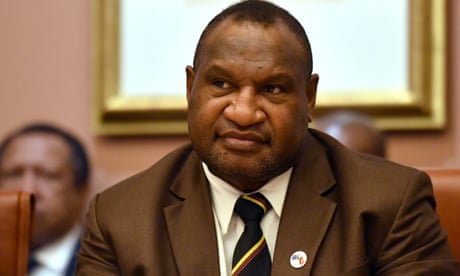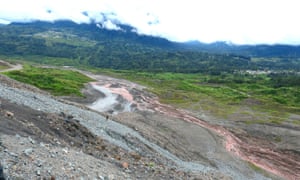Politics and Porgera: why Papua New Guinea cancelled the lease on one of its biggest mines
The announcement not to renew the goldmine lease is fraught but part of an attempt to ‘take back PNG
The announcement not to renew the goldmine lease is fraught but part of an attempt to ‘take back PNG
A view of tailings at Barrick Gold Corp’s Porgera mine, Papua New Guinea. Photograph: Catherine Coumans/Reuters
Late in April, in the middle of a global pandemic and slow-boiling domestic economic crisis, the government of Papua New Guinea made the surprising announcement not to extend the mining lease on a goldmine that contributes roughly 10% of the country’s total exports.
The announcement not to renew the special mining lease for the Porgera mine was a shock, not least to the mine’s operator, Barrick Gold, and their joint venture partner Zijin Mining.

Papua New Guinea will not be dependent on Australia in 10 years, new PM says
Porgera is one of Papua New Guinea’s longest running goldmines. Operating for 30 years in the highlands province of Enga, this large mine was expected to produce around 250,000 ounces of gold in 2019.It employs more than 5,000 people and the 5% landowner and provincial equity stakehas helped to fast-track the efforts to bring services and education to one of the country’s most remote provinces.
While a significant economic contributor, the mine has also brought with it significant controversy, including concerns over human rights, environmental issues and conflicts over compensation.
While the government seems within its rights not to renew the lease, the blindsiding of the announcement has led Barrick to lash out, saying the move was “tantamount to nationalisation without due process”.Sign up for the Guardian’s weekly Pacific coronavirus email
So why has the government taken this drastic action?
Prime Minister Marape was sworn into office in May 2019 and quickly set a narrative to “take back PNG”, arguing that the PNG people were not getting their fair share of the benefits of the formal economy and major natural resource projects. PNG’s ongoing economic crisis has been well documented and is only set to deepen in the fallout of Covid-19. As the tenth most natural resource-dependent economy in the world it is no surprise that the natural resource sector found itself in the government’s crosshairs.
The government is in the middle of negotiating a number of major natural resource deals – PNG LNG expansion, Papua LNG, P’nyang LNG, Frieda River copper and gold, and Wafi Golpu gold – that have the potential to transform PNG’s economic prospects for decades if properly negotiated. The 2020 oil price collapse has sent many of these projects back into the freezer and forced the government to narrow its sights. The decision on Porgera is an attempt from the government to both harvest more benefit from existing projects and to send a shot across the bow to projects still in negotiation that they mean business.
The government is walking a tightrope. It should, of course, be looking to extract every cent of benefit from these projects that it can. But if the government pushes too far, and acts too erratically, already weak investor sentiment will evaporate. While the people of Papua New Guinea own the resources under their feet, the PNG resource industry is not yet at a point where it can exploit them without foreign capital and expertise.
It’s no secret that pressure for a move on Porgera was a theme in local politics. The popular Enga governor, Peter Ipatas, was keen for the province to get a greater stake in the mine’s future. Ipatas is one of the country’s most successful politicians, and was among a group of influential governors whose moves last year swung the prime ministership to Marape.
Yet the limits of the government’s approach are already being tested. Marape had hoped Barrick would keep the mine operating while negotiating its exit. But the company’s firm refusal of that option and its immediate shutdown of the mine have demonstrated its bargaining power. Barrick’s Chinese joint venture partner, Zijin, has flagged international political ramifications, warning the lease dispute could damage bilateral relations between PNG and China.
PNG could find another operator to take over the mine and re-open it, but would likely find that tricky in the midst of a high-stakes legal dispute.
The immediate prospects are shaping up as a lose-lose outcome for both sides. PNG is taking the income hit right when it needs to stabilise its finances. But any compromise to allow Barrick to continue operating would dismantle the strong local support that Marape has won by being seen to “take back” the mine for the country.
Barrick is big and multinational enough to survive without the Porgera revenue, but the longer a legal dispute with the government goes on, the more its claims to a social licence to return to operations would be diminished.
Both sides might welcome a timely intervention by the courts that could give them space to step away from the high-stakes conflict and negotiate an appropriate face-saving compromise.
Late in April, in the middle of a global pandemic and slow-boiling domestic economic crisis, the government of Papua New Guinea made the surprising announcement not to extend the mining lease on a goldmine that contributes roughly 10% of the country’s total exports.
The announcement not to renew the special mining lease for the Porgera mine was a shock, not least to the mine’s operator, Barrick Gold, and their joint venture partner Zijin Mining.

Papua New Guinea will not be dependent on Australia in 10 years, new PM says
Porgera is one of Papua New Guinea’s longest running goldmines. Operating for 30 years in the highlands province of Enga, this large mine was expected to produce around 250,000 ounces of gold in 2019.It employs more than 5,000 people and the 5% landowner and provincial equity stakehas helped to fast-track the efforts to bring services and education to one of the country’s most remote provinces.
While a significant economic contributor, the mine has also brought with it significant controversy, including concerns over human rights, environmental issues and conflicts over compensation.
While the government seems within its rights not to renew the lease, the blindsiding of the announcement has led Barrick to lash out, saying the move was “tantamount to nationalisation without due process”.Sign up for the Guardian’s weekly Pacific coronavirus email
So why has the government taken this drastic action?
Prime Minister Marape was sworn into office in May 2019 and quickly set a narrative to “take back PNG”, arguing that the PNG people were not getting their fair share of the benefits of the formal economy and major natural resource projects. PNG’s ongoing economic crisis has been well documented and is only set to deepen in the fallout of Covid-19. As the tenth most natural resource-dependent economy in the world it is no surprise that the natural resource sector found itself in the government’s crosshairs.
The government is in the middle of negotiating a number of major natural resource deals – PNG LNG expansion, Papua LNG, P’nyang LNG, Frieda River copper and gold, and Wafi Golpu gold – that have the potential to transform PNG’s economic prospects for decades if properly negotiated. The 2020 oil price collapse has sent many of these projects back into the freezer and forced the government to narrow its sights. The decision on Porgera is an attempt from the government to both harvest more benefit from existing projects and to send a shot across the bow to projects still in negotiation that they mean business.
The government is walking a tightrope. It should, of course, be looking to extract every cent of benefit from these projects that it can. But if the government pushes too far, and acts too erratically, already weak investor sentiment will evaporate. While the people of Papua New Guinea own the resources under their feet, the PNG resource industry is not yet at a point where it can exploit them without foreign capital and expertise.
It’s no secret that pressure for a move on Porgera was a theme in local politics. The popular Enga governor, Peter Ipatas, was keen for the province to get a greater stake in the mine’s future. Ipatas is one of the country’s most successful politicians, and was among a group of influential governors whose moves last year swung the prime ministership to Marape.
Yet the limits of the government’s approach are already being tested. Marape had hoped Barrick would keep the mine operating while negotiating its exit. But the company’s firm refusal of that option and its immediate shutdown of the mine have demonstrated its bargaining power. Barrick’s Chinese joint venture partner, Zijin, has flagged international political ramifications, warning the lease dispute could damage bilateral relations between PNG and China.
PNG could find another operator to take over the mine and re-open it, but would likely find that tricky in the midst of a high-stakes legal dispute.
The immediate prospects are shaping up as a lose-lose outcome for both sides. PNG is taking the income hit right when it needs to stabilise its finances. But any compromise to allow Barrick to continue operating would dismantle the strong local support that Marape has won by being seen to “take back” the mine for the country.
Barrick is big and multinational enough to survive without the Porgera revenue, but the longer a legal dispute with the government goes on, the more its claims to a social licence to return to operations would be diminished.
Both sides might welcome a timely intervention by the courts that could give them space to step away from the high-stakes conflict and negotiate an appropriate face-saving compromise.

No comments:
Post a Comment